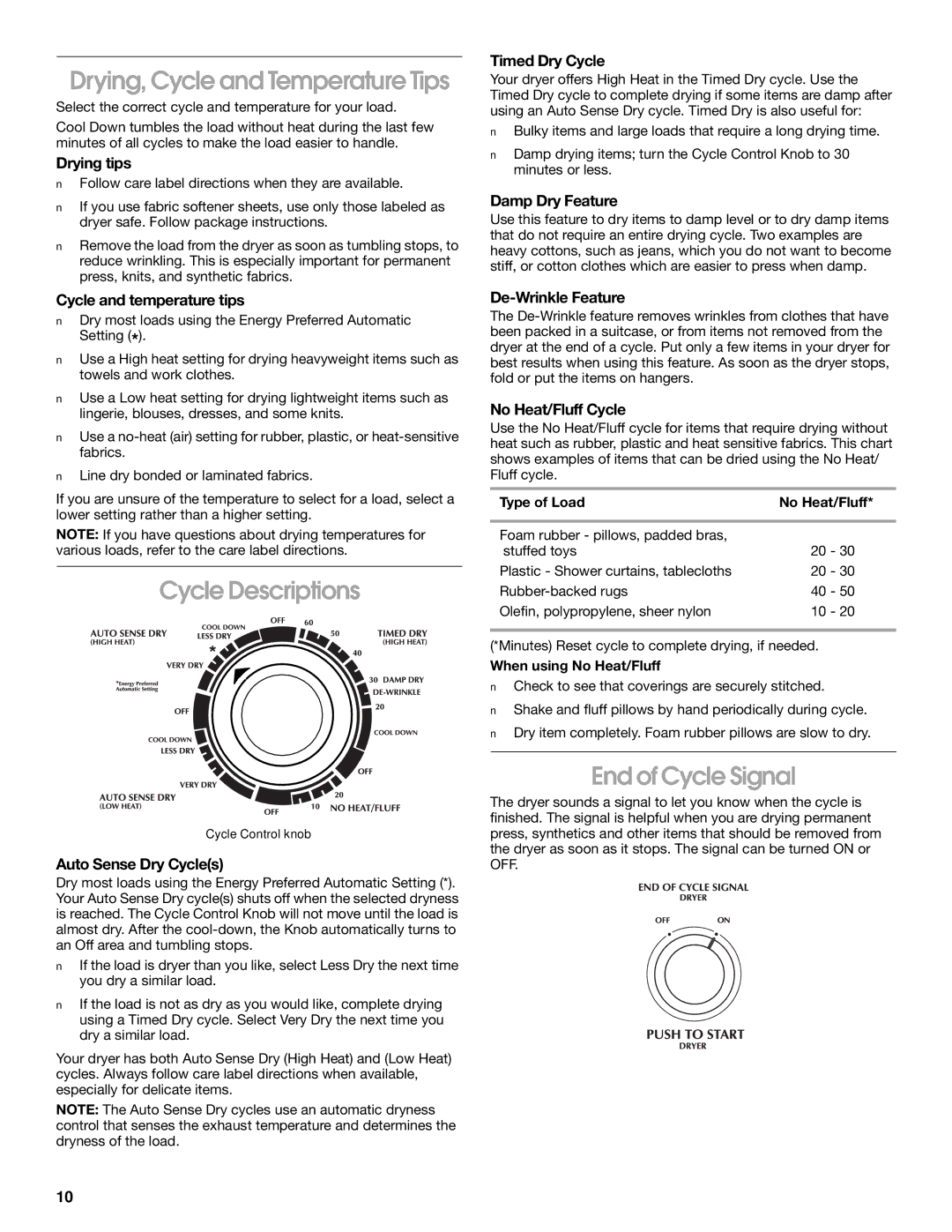
Drying, Cycle and Temperature Tips
Select the correct cycle and temperature for your load.
Cool Down tumbles the load without heat during the last few minutes of all cycles to make the load easier to handle.
Drying tips
■Follow care label directions when they are available.
■If you use fabric softener sheets, use only those labeled as dryer safe. Follow package instructions.
■Remove the load from the dryer as soon as tumbling stops, to reduce wrinkling. This is especially important for permanent press, knits, and synthetic fabrics.
Cycle and temperature tips
■Dry most loads using the Energy Preferred Automatic Setting (*).
■Use a High heat setting for drying heavyweight items such as towels and work clothes.
■Use a Low heat setting for drying lightweight items such as lingerie, blouses, dresses, and some knits.
■Use a
■Line dry bonded or laminated fabrics.
If you are unsure of the temperature to select for a load, select a lower setting rather than a higher setting.
NOTE: If you have questions about drying temperatures for various loads, refer to the care label directions.
Cycle Descriptions
Cycle Control knob
Auto Sense Dry Cycle(s)
Dry most loads using the Energy Preferred Automatic Setting (*). Your Auto Sense Dry cycle(s) shuts off when the selected dryness is reached. The Cycle Control Knob will not move until the load is almost dry. After the
■If the load is dryer than you like, select Less Dry the next time you dry a similar load.
■If the load is not as dry as you would like, complete drying using a Timed Dry cycle. Select Very Dry the next time you dry a similar load.
Your dryer has both Auto Sense Dry (High Heat) and (Low Heat) cycles. Always follow care label directions when available, especially for delicate items.
NOTE: The Auto Sense Dry cycles use an automatic dryness control that senses the exhaust temperature and determines the dryness of the load.
Timed Dry Cycle
Your dryer offers High Heat in the Timed Dry cycle. Use the Timed Dry cycle to complete drying if some items are damp after using an Auto Sense Dry cycle. Timed Dry is also useful for:
■Bulky items and large loads that require a long drying time.
■Damp drying items; turn the Cycle Control Knob to 30 minutes or less.
Damp Dry Feature
Use this feature to dry items to damp level or to dry damp items that do not require an entire drying cycle. Two examples are heavy cottons, such as jeans, which you do not want to become stiff, or cotton clothes which are easier to press when damp.
De-Wrinkle Feature
The
No Heat/Fluff Cycle
Use the No Heat/Fluff cycle for items that require drying without heat such as rubber, plastic and heat sensitive fabrics. This chart shows examples of items that can be dried using the No Heat/ Fluff cycle.
Type of Load | No Heat/Fluff* |
|
|
Foam rubber - pillows, padded bras, |
|
stuffed toys | 20 - 30 |
Plastic - Shower curtains, tablecloths | 20 - 30 |
40 - 50 | |
Olefin, polypropylene, sheer nylon | 10 - 20 |
(*Minutes) Reset cycle to complete drying, if needed.
When using No Heat/Fluff
■Check to see that coverings are securely stitched.
■Shake and fluff pillows by hand periodically during cycle.
■Dry item completely. Foam rubber pillows are slow to dry.
End of Cycle Signal
The dryer sounds a signal to let you know when the cycle is finished. The signal is helpful when you are drying permanent press, synthetics and other items that should be removed from the dryer as soon as it stops. The signal can be turned ON or OFF.
10
